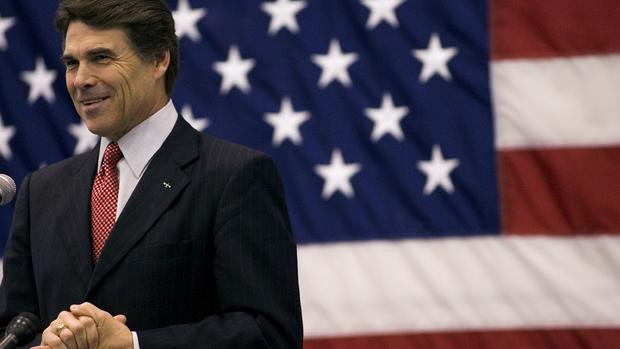Will Rick Perry's Texas swagger help or hurt?
The first time you see Republican presidential candidate Rick Perry, it hits you immediately: The Texas governor has the swagger of a movie star. It's there in his alpha-male confidence, his Marlboro Man drawl, his propensity for cowboy boots. This is a guy who used one shot with his laser-sighted pistol to take out a coyote that was menacing his dog during a jog last year; at the Iowa state fair Monday, as he "chomped on meat and a hard-boiled egg and struck rugged poses," the strong gun rights advocate notably declined to tell Politico's Ben Smith whether he was packing.
Perry's swagger has helped him become the longest-serving governor in Texas history. Comments that have raised red flags among some Americans - such as his suggestion that Texas may have to secede from the union if "Washington continues to thumb their nose at the American people" - have only enhanced Perry's reputation among his supporters. Perry was born in rural Texas to a pair of tenant farmers; he has discussed in interviews how he didn't have indoor plumbing when he was young, and how cracks in the walls allowed dust storms to leave a coating of dust on the couch. For many Republicans, particularly Tea Partiers desperate for a populist voice, he represents a welcome break both from what they see as the passionless, urban intellectualism of President Obama and the calculating, country-club Republicanism of Perry's chief rival for the nomination, Mitt Romney.
CBSNews.com special report: Election 2012
Yet Perry's off-the-cuff style - which stands in stark contrast to many of his rivals, who can be almost impossible to knock off their talking points - can get him into trouble. On Monday, just two days after officially kicking off his campaign, Perry said that if Federal Reserve Board Chairman Ben Bernanke decides to start "printing more money," it's "almost treasonous,"adding that "we would treat him pretty ugly down in Texas."
The comment prompted denunciations, and not just from Democrats. Republicans aligned with former President George W. Bush - many of whom, it should be noted, disdain Perry - called the comment "inappropriate and unpresidential," in the words of former White House and Treasury Department spokesman Tony Fratto. Karl Rove added: "Governor Perry is going to have to fight the impression that he's a cowboy from Texas. This simply added to it."
According to Republican strategist Mary Matalin, being seen as a "cowboy from Texas" isn't such a problem. Asked about Perry's swagger, Matalin sent an email lauding the Texas governor's "grit."
"People of all persuasions are sick, sick, SICK of mollycoddling, pandering and Edwardian (as in John Edwards) phoniness," said Matalin. "It doesn't get any more real than Perry. The elite may call it 'swagger'; I call it a real man with real convictions and the courage to stand up for them, which happen to comport with the majority of Americans. Or as they say in Texas, he is hat and cattle. And the coupe de gras, he is a spiritually anchored and philosophically happy warrior."
The risk for Perry, who has never had to compete on a national stage, is that his willingness to tell-it-like-he-thinks-it-is will prompt him to make a comment so incendiary that it sinks his campaign. There are signs that his campaign has realized as much: On Tuesday, as CBS News political analyst John Dickerson noted, Perry seemed to dial back the rough-and-tumble rhetoric, speaking in softer tones and abandoning "the preacherlike cadence" he had employed the previous day.
Yet Perry cannot walk away from his confrontational, walk-the-line style if he wants to win the nomination - that style, after all, is a large part of what draws conservatives to him in the first place. If Perry retreats too obviously into careful talking points and poll-tested messaging, he'll start to look to many in the Republican base like just another politician, and thus the last person they want to send to Washington.
The good news for Perry is that in the current political environment, it's tough for a Republican presidential candidate to go too far in criticizing President Obama. Asked Tuesday if the president loves his country, Perry said he'd have to ask him; in his speech announcing his candidacy, he accused Mr. Obama of "downgrading the hope for a better future for our children." Neither comment stirred any sort of real trouble.
The bigger challenge for the candidate will come in trying to draw distinctions with Romney and the rest of the Republican field. Perry needs to hang on to the charm that turned him into a frontrunner without alienating those GOP primary voters more interested in economic recovery than incendiary rhetoric. Whether he can pull off that balancing act may well dictate whether he emerges from the sure-to-be-contentious primary season as the last man standing.
Rick Perry is learning about national scrutiny
Perry stands by Bernanke "treasonous" remark
Perry calls for more "personal responsibility"

